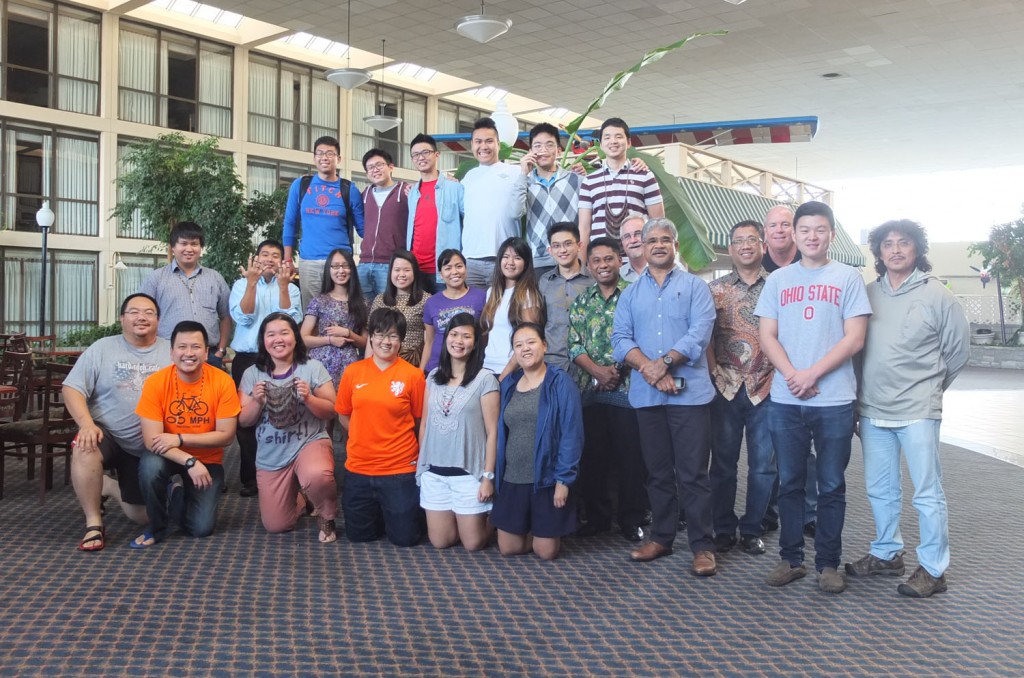 We just finished our annual Overseas Mission Conference (OMC) last week. This year conference was held in Columbus, Ohio and was attended by more than 25 people. Almost half of the attendees are new. We were really glad meeting and connecting with our new brother and sister.
We just finished our annual Overseas Mission Conference (OMC) last week. This year conference was held in Columbus, Ohio and was attended by more than 25 people. Almost half of the attendees are new. We were really glad meeting and connecting with our new brother and sister.
We are thankful for the leadership of Erik Tedjasaputra in this year OMC. Erik coordinated all the logistical details well that everything ran smoothly. We are thankful for ICF Columbus in hosting this year OMC. We also want to thank our speakers, Mr. Jamie Winship, Mr. Kie Eng Go, Professor Daniel Kameo, Mr. Christian Sohilait, Mr. Ivan Santoso, Mr. John Wood, Mr. Kris Pribadi, Mr. Moses Mangunrahardja, and Mr. Christian Darmahkasih.
It is important for future reference to understand the context of OMC 22. We are living in the midst of a growing global economic, although there is a threat of shrinking China economy and slowing Indonesia development. A lot of Indonesian in the US is still having a very positive outlook of the economy and is looking for opportunities to serve in Indonesia. However, the confidence has been somewhat shaken by the inability of the current president, Jokowi, in stabilizing the Rupiah and in managing both the domestic politics and economy.
It is President Jokowi agenda to boost the economy by utilizing the forces of globalization. The president is inviting a lot of investor to participate in building the badly needed infrastructures. The president has also fought corruption, which is the root cause of the country uncompetitive economy.
With this context, it is important for us to realize that everything is connected and somewhat affected by the forces of globalization. Specifically, we want to learn how these forces has impacted the economy and politic of Indonesia in local level and what can we do from here as Indonesian Christians in US. Thus the conference is titled “Facing the Tides of Globalization in Indonesia as Indonesian Christian in USA”.
The letter of Jeremiah to the exile in Babylon is very applicable to us in this case. The letter contained in Jeremiah 29 reveals God’s plan for His people. The Lord God almighty declares His plan in verse 11, “For I know the plan I have for you, …, plans to prosper you and hot to harm you, plans to give you hope and a future”. This passage describes the underlying message of all OMC 22 speakers.
Mr. Jaime Winship describes the importance for us to stay true to our identity as engineers, accountants, entrepreneurs, scientists, or other vocations. However, we need to live out our vocation with Kingdom mindset. This means that we need to serve God and only God. We should obey the government until we are forced to disobey God’s commandment or to disguise our identity as the follower of Jesus Christ. Mr. Winship is describing God’s prescription for a nation to become prosperous. In Jeremiah 29:12-14, God explains the two requirements needed for Israel to be prosperous. First, the people would seek God with all their hearts. This means that there must be believers living among them, which is the precondition and primary means for God’s blessing to flow. Second, the people will hear and obey God. Then, God promises He will restore their fortunes.
Professor Kameo and Mr. Kie Eng Go agree that the only way the country can prosper is for the people to love their land. Professor Kameo points out that our economy is heavily dependant on imports. Our primary economic contributors are manufacturing and agriculture. These two sectors have more than 70% import content. He suggested for us to focus on 2 sectors, creative economy sector and micro enterprises. The creative economy sector has eclipsed the contribution of mining sector as of 2015 and depended on 100% local raw material. The number of micro enterprise in Indonesia has reached 57 million units or 99.9% of total enterprise in Indonesia. The micro enterprise has contributed 58% of GDP and has invested more than $55 Billion last year.
Mr. Kie Eng Go stresses the importance of loving our own land especially for indigenous rural area population. The lack of infrastructures in rural area, in this case Lanny Jaya regency in Papua, makes urban living very attractive. The only way for the rural area to be developed is for educated and skillful people to be willing to invest their lives. Only people native to the area those are mostly willing to fight the unbelievably uncomfortable conditions in rural area. FICA is called to help the rural area by mobilizing the resources existed among the Indonesian Diaspora or other entities in US.
In line with Mr. Go idea on Diaspora movement, Mr. Mangunrahardja, Mr. Darmahkasih, Mr. Pribadi, and Mr. Wood shared their passion to participate in Indonesia development by utilizing their vocation and resources in the US. Mr. Mangunrahardja develops a website that can connect agents of change in Indonesia with compassionate individuals outside Indonesia. Mr. Darmahkasih wants us to utilize our vocation to participate in rural area development. Mr. Pribadi and Mr. Wood mobilize US churches to help Indonesia church to grow. Mr. Ivan Santoso reminded us that Jesus is always looking for the lost. In both his morning devotions, Mr. Santoso asked us to follow Jesus example to seek and serve the lost as Jesus did in Matthew 15.
Although Ms. Marjorie Warouw was not able to come, she who recently went to serve Syrian refugees in Jordan, also shared the urgent need to respond to the global refugee crisis and the immense opportunities in front of us in Indonesia and in the U.S. She also highlighted the importance of caring for refugees as part of God’s covenant with Israel (Old Testament) and the Church (New Testament).
Mr. Christian Sohilait, as regency secretary of Lanny Jaya, added to Mr. Kie Eng Go comments on the importance of education. Mr. Sohilait argues that the core problem of Papua is for the Papuan to be the host (Tuan rumah) in their own house (di rumah sendiri). They need to be able to rule their own people and develop their own land. Unfortunately, less than 1% Papuan has college education. Only, 14% of Papuan has finished elementary and majority of Papuan cannot read or write. Numeracy has been a problem in Papua, which hinders them from using banking, saving, and loan services. Mr. Sohilait wants us to help Papua especially in the area of education. He also wants us to continue to promote tourism for Papua to increase their local income.
After hearing all these wonderful speakers, FICA is challenged to figure out how we can connect the resources available in the US with the need in Indonesia. We will continue to seek God wholeheartedly and listen to His voice. We will also continue to listen to the need and passion of Indonesian and Christians in the US. We hope by next year, we could formulate what and how can we channel the resources available to us. See you all next year. To God be all the glory.
Leonard Winardi
FICA President
